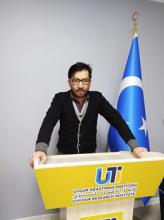Uyghur exile detained in Morocco on Interpol red notice from China
Update: The next hearing for Aishan is set to be held tomorrow, September 1, at 09/9am at Rabat's court of cassation.
Update: Ahead of a scheduled but likely postponed second hearing of Aishan, Interpol today (August 25) canceled the Red Notice issued on him by China, after suspending it earlier.
Update: First hearing took place on August 12, starting two hours later than the set 09 (am) starting time. Foreign diplomats from several western countries attended. Media, local and foreign alike, barred from entering. Mr Aishan was represented by three lawyers. Next hearing is set for August 26.
Update: Moroccan authorities confirmed on July 27 that Mr. Aishan was detained at Casablanca airport while in transit due to an Interpol red notice requested from China.
Update: After many lawyers refuse to take on the case, a lawyer has accepted representation Mr. Aishan and is visiting Tiflit prison and detention centre.
Update: The Moroccan-Chinese extradition treaty went into effect January this year, and this will, if Mr. Aishan is not set free due to this politically motivated Interpol red notice, be the first case of China seeking extradition in Morocco since the treaty went into effect.
On July 25, 2021, Safeguard Defenders was informed by members of the Uyghur community in exile in Germany and Norway of the detention and high risk of deportation of Turkey-based, 34-year-old Uyghur exile and activist Yidiresi Aishan from Morocco to the People’s Republic of China. According to his family and close friends, Mr. Aishan was stopped at Casablanca airport on the late evening of July 19 after a Pegasus Airline flight PC651 from Istanbul and is currently held at the Tiflet Detention Centre. No official documentation as to the reasons for his arrest has so far been provided and according to his family, no lawyer has yet been assigned to him in Morocco.
On July 24, his wife received a short phone call from him at the detention centre, during which he stated he was to be deported to China. After this, the line was abruptly cut off. No further news has been received.
 After graduating in Xinjiang, Mr. Aishan moved to Turkey in 2012 where he worked as a computer engineer. Members of the Uyghur community state he was frequently active in assisting other members from the exile community in translation efforts with local authorities. At least from 2016 onwards he became active in an Uyghur diaspora newspaper in Turkey, assisting other activists in media outreach, collecting testimonies on the atrocities in Xinjiang, and publicly denouncing these.
After graduating in Xinjiang, Mr. Aishan moved to Turkey in 2012 where he worked as a computer engineer. Members of the Uyghur community state he was frequently active in assisting other members from the exile community in translation efforts with local authorities. At least from 2016 onwards he became active in an Uyghur diaspora newspaper in Turkey, assisting other activists in media outreach, collecting testimonies on the atrocities in Xinjiang, and publicly denouncing these.
Between 2016 and 2018, Mr. Aishan was detained three times by Turkish authorities and held for a span of several months at the local deportation centre. A Turkish tribunal document from 17 March 2017, ordering his immediate release from the Kayseri Removal Center, documents his first detention starting 29 October 2016 with the expressed scope of deportation to the PRC. The document also cites his obligation to report to the center daily and does not overturn the decision to extradite.
On 2 April 2020, Mr. Aishan finally receives a humanitarian residence permit in Turkey, and a criminal record issued by Turkish authorities in 2021 shows his record is blank. He is a legal resident of Turkey.
Mr. Aishan had expressed repeated fear of being deported, also due to the direct requests made by local county police in Bugur County, Xinjiang. Where he had been previously stopped from leaving Turkey three times by local Turkish authorities, on July 19 he was allowed to board a flight for Casablanca, Morocco. While allowed to leave this time, he was questioned for half an hour at passport control at Istanbul Airport and warned by border police that “if he left, he would not be able to return”. Upon his arrival at Casablanca Airport he was immediately detained) and transferred to Tiflet Detention Centre from where he called his wife on July 24.
Tiflet prison made the news in 2012, when, after a visit from the then UN Special Rapporteur on Torture Juan E. Mendez, the prison director threatened the inmates after the departure of Mr. Mendez. Mr. Mendez concluded that both physical and psychological torture were ongoing, frequently, at the prison.
Around the same time of his arrest, and after three years without any contact whatsoever, his father-in-law suddenly called Aishan’s wife in Turkey from Xinjiang asking where Mr. Aishan was. Together with the direct approaches made prior by local county police, these bear all the hallmarks of Chinese authorities’ trademark practices to have a person returned at any cost.
 Mr. Aishan’s case is only the latest in a rapidly growing series of cases around the world. Only a little over a month ago, international media attention prevented the deportation of Wang Jingyu from Dubai, where he was transiting from Turkey on his way to the United States. This week, Xu Zheng, another Chinese national, escaped Ukraine where he thought he was being sought by Chinese authorities for his involuntary return, and made it to Amsterdam, the Netherlands, to seek asylum.
Mr. Aishan’s case is only the latest in a rapidly growing series of cases around the world. Only a little over a month ago, international media attention prevented the deportation of Wang Jingyu from Dubai, where he was transiting from Turkey on his way to the United States. This week, Xu Zheng, another Chinese national, escaped Ukraine where he thought he was being sought by Chinese authorities for his involuntary return, and made it to Amsterdam, the Netherlands, to seek asylum.
Last week, a federal Grand Jury in New York indicted nine Chinese operatives for acting at the direction and under the control of PRC government officials, conducting surveillance of and engaging in a campaign to harass, stalk and coerce certain residents of the United States to return to the PRC as part of a global, concerted and extralegal repatriation effort known as “Operation Fox Hunt”.
Notwithstanding the exponential increase in the number of bilateral extradition agreements ratified around the world since Xi Jinping’s rise to power, China is facing a series of setbacks in the execution of its formal extradition agreements. On July 16, the Swedish migration board issued a stay in the execution of a deportation order for Baolige Wurina, an Inner Mongolian dissident living in Sweden for over ten years. Yet the hunt for exiles and dissidents is not waning. Extralegal repatriation efforts, pressure, and threats exercised to induce ‘voluntary returns’, or waiting for passage in a country that may more easily cede to extradition requests are becoming the daily order of business.
Flight tickets, legal- and official documents from Turkish police and court, and other evidence have been reviewed by Safeguard Defenders to corroborate this information as far as possible.